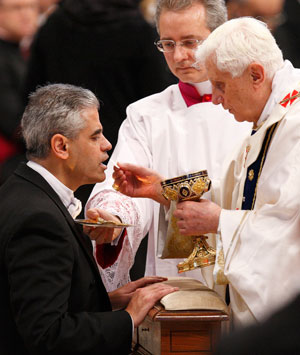WASHINGTON (CNS) — Pope Benedict XVI’s decision to resign Feb. 28 “was taken with much grace, courage, wisdom and humility,” said the most recent U.S. ambassador to the Holy See, Miguel Diaz.

Diaz, now the University of Dayton’s professor of faith and culture, told Catholic News Service in a Feb. 11 phone interview that he hopes that in this period before a new pope is elected, the entire church will pray about and discuss the possibilities presented by a change in the top leadership of the Catholic Church.
Diaz recalled fondly his meetings with Pope Benedict while he served as ambassador from August 2009 until last November. A replacement for the post has not yet been named. President Barack Obama and Secretary of State John Kerry both issued statements of appreciation for the pope’s leadership and recalled their meetings with him.
Diaz said he and the pontiff’s shared personal history as theologians who were called to service outside their chosen professions made for a bond between them. That they are both returning to their theological work now feels like another point of commonality, he said.
“I always found him to be very personable,” Diaz said, adding that the two of them also enjoyed switching their conversation among the several languages that they both speak. “And he always responded to my kids.”
The pope’s decision to resign because of weakening health “has put a more human face to the papacy,” Diaz said. “It was a courageous decision to step down.”
In his statement, Obama offered his appreciation and prayers to Pope Benedict. “Michelle and I warmly remember our meeting with the Holy Father in 2009, and I have appreciated our work together over these last four years. The church plays a critical role in the United States and the world, and I wish the best to those who will soon gather to choose (his) successor.”
Kerry also offered his prayers for the pope and remembered attending a Mass in Washington five years ago at which Pope Benedict said Americans remain a people of hope and America a land of freedom and opportunity. “He believes, as we do, that the qualities that have made our nation strong can also help make the world freer and more just.”
Diaz said that as the first pope to resign in more than 600 years, Pope Benedict’s action offers a model for other leaders to recognize that it can be acceptable to step down when human limitations become overwhelming.
“If the pope can do that, recognizing the limitations of his body,” Diaz said, then “all kinds of religious leaders” might feel the example opens a door when they begin to recognize limitations in themselves.
While one example of that might be church leaders’ handling of situations such as sexual abuse scandals, Diaz said it’s not the only type of situation that might warrant such a step.
“There will be cases where people say, ‘Look at X, Y or Z,’ and that leader is not competent to lead in that situation,” Diaz said. “This has the potential to prompt reflection for many of us in positions of leadership. We are all in need of grace, none of us is perfect.”
Diaz said that with the return to his role as a theologian, he’s especially excited by the possibilities this moment holds for the church.
“What we need in this moment of grace is to have a national and international conversation about who the next leader should be,” he said. In a time when “every faithful Catholic has had those moments when we contemplate leaving the church, or fear that ‘my kids are going to leave,'” this is a moment when Catholicism’s leaders should discuss how to meet such challenges, he said.
With the pope’s resignation coming in Lent, a time of fasting, prayer and reflection, Diaz said he hopes to encourage and participate in dialogue that leads to transformation, just as Lent in the liturgical tradition “leads to resurrection, transformation and change.”
Diaz noted that of course “we don’t have a vote” in who is elected pope, but that people at all levels of the church can pray and offer guidance to those who do vote, encouraging them to consider who can best tackle the complex issues that lie ahead for the church.
“We don’t know if the cardinals are going to have this conversation, but they should,” he said.
Reminded that Obama has not yet named a replacement for him as ambassador, Diaz observed that the changing situation in the Vatican does make him a little wistful about the job he left.
“If the president wanted to send me back, I might not be reluctant,” he said, adding, “I am at the service of my nation and my church, both of which I love.”
— By Patricia Zapor Catholic News Service





